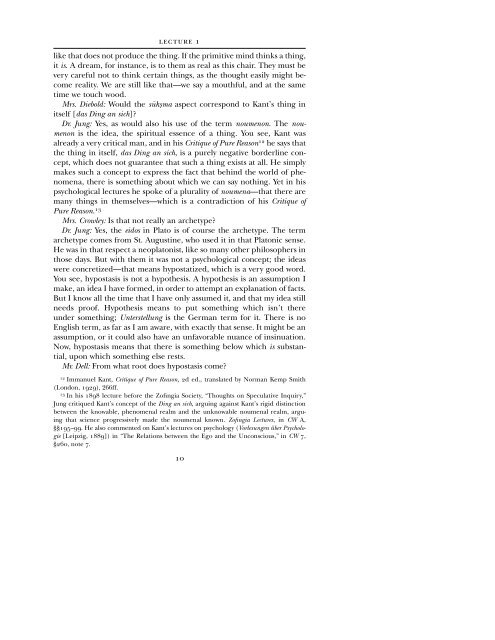CG JUNG - Countryside Anarchist
CG JUNG - Countryside Anarchist
CG JUNG - Countryside Anarchist
Create successful ePaper yourself
Turn your PDF publications into a flip-book with our unique Google optimized e-Paper software.
LECTURE 1<br />
like that does not produce the thing. If the primitive mind thinks a thing,<br />
it is. A dream, for instance, is to them as real as this chair. They must be<br />
very careful not to think certain things, as the thought easily might become<br />
reality. We are still like that—we say a mouthful, and at the same<br />
time we touch wood.<br />
Mrs. Diebold: Would the sÖküma aspect correspond to Kant’s thing in<br />
itself [das Ding an sich]?<br />
Dr. Jung: Yes, as would also his use of the term noumenon. Thenoumenon<br />
is the idea, the spiritual essence of a thing. You see, Kant was<br />
already a very critical man, and in his Critique of Pure Reason 12 he says that<br />
the thing in itself, das Ding an sich, is a purely negative borderline concept,<br />
which does not guarantee that such a thing exists at all. He simply<br />
makes such a concept to express the fact that behind the world of phenomena,<br />
there is something about which we can say nothing. Yet in his<br />
psychological lectures he spoke of a plurality of noumena—that there are<br />
many things in themselves—which is a contradiction of his Critique of<br />
Pure Reason. 13<br />
Mrs. Crowley: Is that not really an archetype?<br />
Dr. Jung: Yes, the eidos in Plato is of course the archetype. The term<br />
archetype comes from St. Augustine, who used it in that Platonic sense.<br />
He was in that respect a neoplatonist, like so many other philosophers in<br />
those days. But with them it was not a psychological concept; the ideas<br />
were concretized—that means hypostatized, which is a very good word.<br />
You see, hypostasis is not a hypothesis. A hypothesis is an assumption I<br />
make, an idea I have formed, in order to attempt an explanation of facts.<br />
But I know all the time that I have only assumed it, and that my idea still<br />
needs proof. Hypothesis means to put something which isn’t there<br />
under something; Unterstellung is the German term for it. There is no<br />
English term, as far as I am aware, with exactly that sense. It might be an<br />
assumption, or it could also have an unfavorable nuance of insinuation.<br />
Now, hypostasis means that there is something below which is substantial,<br />
upon which something else rests.<br />
Mr. Dell: From what root does hypostasis come?<br />
12 Immanuel Kant, Critique of Pure Reason, 2d ed., translated by Norman Kemp Smith<br />
(London, 1929), 266ff.<br />
13 In his 1898 lecture before the Zofingia Society, “Thoughts on Speculative Inquiry,”<br />
Jung critiqued Kant’s concept of the Ding an sich, arguing against Kant’s rigid distinction<br />
between the knowable, phenomenal realm and the unknowable noumenal realm, arguing<br />
that science progressively made the noumenal known. Zofingia Lectures, in CW A,<br />
§§195–99. He also commented on Kant’s lectures on psychology (Vorlesungen über Psychologie<br />
[Leipzig, 1889]) in “The Relations between the Ego and the Unconscious,” in CW 7,<br />
§260, note7.<br />
10


